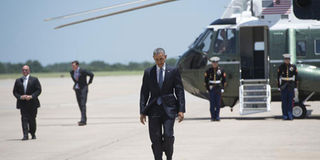Obama Sr: The portrait of a man torn between family and country

US President Barack Obama walks from Marine One to Air Force One prior to departure from Tinker Air Force Base in Oklahoma City, Oklahoma, July 16, 2015. AFP PHOTO | SAUL LOEB
What you need to know:
- Like many of his generation, Obama Sr grew up in a polygamous family where the father was a remote, authoritarian figure and where women had little say in the management of their families.
- While his father, Onyango Obama, worked as a servant cook for a white family in Nairobi, he ran his own household with an iron fist, often scolding and beating his son for not working hard enough in school.
- It was the search for this elusive absent father that prompted Barack Obama Jr to search for his roots, a journey that he describes in his memoir, Dreams from My Father.
It is no secret that Barack Obama Sr, the father of the current president of the United States, was a brilliant but reckless and arrogant man who left behind a trail of wounded souls.
Kenyans are uncomfortable talking about the flaws and weaknesses of the Kenyan who spawned the first black American president. However, I think it is important to look at the complex life of the senior Obama, especially now that his son is about to make an official visit to his father’s homeland.
I, therefore, highly recommend that Kenyans read The Other Barack, a book by American reporter Sally Jacobs, which is not only an unflinching exposé of the senior Obama’s difficult childhood, his colourful student life in the United States, his multiple marriages, and his promising but failed career, but is also a portrait of a conflicted man caught between the demands of clan and tradition and the needs of a newly independent, rapidly modernising African nation.
Like many of his generation, Obama Sr grew up in a polygamous family where the father was a remote, authoritarian figure and where women had little say in the management of their families.
While his father, Onyango Obama, worked as a servant cook for a white family in Nairobi, he ran his own household with an iron fist, often scolding and beating his son for not working hard enough in school.
Onyango was a violent man with a furious temper. When his second wife, Obama senior’s mother, finally picked up the courage to leave him, Obama and his sister walked 100 miles looking for her, but she refused to come back.
This rejection by his mother, says Jacobs, would haunt him for the rest of his life and create in him a feeling of unworthiness that made it difficult for him to commit to his own wives and children.
Jacobs unfolds the senior Obama’s university days in Hawaii where he would meet Ann Dunham, who fell in love with the suave and charming Kenyan, married him, and gave birth to the boy who would later become president of the United States.
When Obama got admitted to Harvard University’s post-graduate programme in economics, little did he know that the son he left behind in Hawaii would one day also walk the university’s corridors.
While at Harvard, he would meet his third wife, Ruth, whom he brought back with him to Nairobi when he was beginning his career as an economist.
Obama Sr was polygamous with two white women whose culture and religion forbade polygamy.
He was also promiscuous. His pursued women obsessively. Women were drawn to his flirtatious charm and seductive arrogance.
However, it was not the many women in his life who eventually consumed him; it was the hard drinking culture of the 1970s Nairobi.
His love for Scotch whisky earned him the nickname “Double-Double”. Alcoholism and domestic violence drove Ruth away from him and caused his many children untold anguish. Drink-driving led to several car accidents, the last of which killed him when he was just 46.
Obama Sr struggled to find a balance between his obligations to his large extended family in the village and the family he was raising in the city. In the end, he failed to fulfil both, becoming instead a neglectful and absent husband and father.
It was the search for this elusive absent father that prompted Barack Obama Jr to search for his roots, a journey that he describes in his memoir, Dreams from My Father.
Jacobs’s portrayal of the senior Obama may appear too harsh, but it is, in fact, quite sympathetic. In many ways, the senior Obama’s disappointments and failures were a reflection of the prevailing mood and time.
He could have been a victim of anti-Luo politics, when Jomo Kenyatta’s henchmen controlled State jobs and entrenched a Kikuyu mafia in the president’s inner circle. The assassination of Tom Mboya, who was a friend of Obama’s, left him jaded and unsure of his own future.
Was the senior Obama his own worst enemy or a victim of tribal politics? Jacobs seems to believe that he was both.
[email protected]





